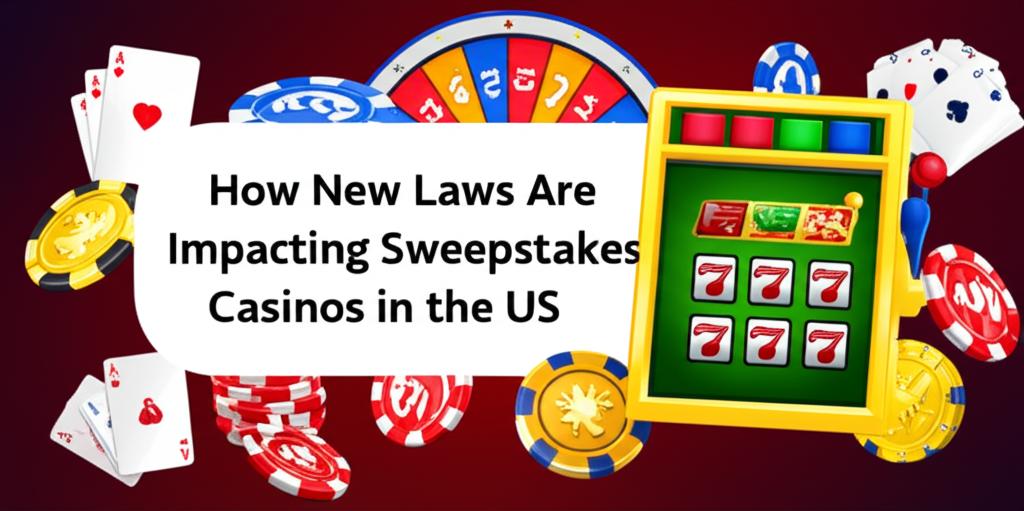Explore how new laws shape sweepstakes casino games across the US, revealing shifting regulations, taxes, and consumer impacts.
How New Laws Impact Sweepstakes Casino Games in the US

Understanding the Shifting Legal Landscape
Sweepstakes casinos in the US face relentless legislative scrutiny as new laws challenge traditional views on casino games, prompting debates over consumer protection and market fairness in the evolving sweepstakes industry.
In recent years, lawmakers have noticed the rapid growth of sweepstakes models and innovative casino games, leaving regulators to grapple with outdated frameworks that inadequately address emerging digital platforms and shifting consumer behaviors.
Some local governments believe these sites resemble traditional gambling too closely, arguing that their casino games blur lines between legal sweepstakes and regulated play. Are Sweepstakes Casino Games Legal in the US [Updated for 2025] ensures awareness and debate.
New proposals suggest stricter registration requirements and potential taxation on casino games to close loopholes. Legislators and industry experts alike debate reforms as states balance regulatory oversight with growth in the sweepstakes market.
Key Legislative Actions Across Multiple States
Several high-profile bills now seek to impose uniform regulations on online casino games and sweepstakes platforms. These proposed laws target virtual currencies, betting limits, and credit card transactions to regulate emerging gaming practices.
States such as Florida, Connecticut, and Maryland are weighing explicit bans amid rising concern over misclassified casino games and sweepstakes operations. Lawmakers emphasize safeguarding residents while critics argue restrictions limit consumer options.
Nevada’s Senate recently passed a bill targeting unlicensed casino operators and online sweepstakes activities, imposing penal measures to deter illegal practices. The resolution aims at aligning digital games with traditional gaming regulations.
In states like Arkansas and New York, bipartisan initiatives are emerging to regulate casino and sweepstakes operations. Lawmakers believe that stricter enforcement can protect communities from unregulated gaming influences and financial risks.
Taxation debates continue as rates from 15% to 25% emerge for both casino and sweepstakes earnings. Supporters believe taxes will fund state programs, while opponents worry high levies stifle innovation and prompt covert operations.
Consumer protection remains central to emerging legislation as reformers advocate for clearer rules governing casino games and sweepstakes activities. Enhanced regulations could introduce fairness, transparency, and responsible mechanics to mitigate potential market abuses.
The Economic Impact of Sweepstakes Casinos
Despite ongoing legal uncertainties, the digital sweepstakes market and related casino games continue thriving, driving billions in purchases and attracting investors who see tremendous growth in this evolving digital entertainment sector.
Several industry analyses forecast that popularity for casino and sweepstakes games will nearly double in coming years. Businesses anticipate increased revenues, urging states to reassess taxation and integration of digital gaming frameworks carefully.
Job creation benefits abound as sweepstakes operators expand, crafting new roles in technology, marketing, and customer support. Local economies experience growth spurts thanks to increased investments in digital casino operations and innovative gaming solutions.
Opponents question whether short-term gains from casino promotions and sweepstakes games outweigh their long-term impacts. Critics voice concerns over shifting revenue away from traditional gambling, potentially diminishing support for state-funded public services.
Many states now weigh the balance between economic benefits fueled by casino revenues and the stricter regulations imposed on sweepstakes operations. This debate drives ongoing examinations of current laws and future industry standards.
Regulatory Concerns and Consumer Protection
Federal authorities urge states to enforce stricter compliance measures over online casino games and sweepstakes promotions. Officials worry that leniency may allow platforms to exploit consumers with misleading advertising tactics seriously.
Consumer advocates highlight insufficient security measures and fairness issues in casino games and sweepstakes platforms. They call for transparency about odds and responsible gameplay protocols to rebuild trust among everyday players.
Proponents compare the need for regulation to approving pharmaceuticals. They argue that casino games and sweepstakes must undergo rigorous testing and adhere to strict standards before reaching consumers, ensuring overall safety and trust.
Some experts assert that ambiguous definitions contribute to inconsistent enforcement of casino gaming and sweepstakes rules. Courts diverge in opinions, leaving regulators uncertain and operators able to navigate legal loopholes with relative ease.
The American Gaming Association persistently lobbies for comprehensive policies regulating casino and sweepstakes operations. Their efforts aim to create uniform standards that protect consumers while ensuring fair competition in an evolving digital landscape.
Future Outlook for Sweepstakes Casinos
Upcoming years will likely bring increased lawsuits and further legislative revisions concerning casino games and sweepstakes operations. Technological advances continue to outpace regulatory changes, challenging lawmakers to keep up effectively today.
New Jersey’s regulatory framework for online gaming inspires fresh approaches among states. Similar models integrating casino oversight and sweepstakes rules offer pathways to clearer, safer, and consistently enforced digital gaming environments.
Industry leaders anticipate shifts in marketing tactics as new laws reshape how casino games and sweepstakes are promoted. Emphasizing transparency, they believe adjustments will enhance consumer confidence and long-term market stability.
Meanwhile, local governments prepare for stronger oversight of digital casino games and sweepstakes platforms. Regulatory bodies plan to invest in specialized training and technology to monitor evolving gaming trends reliably systematically.
Analysts predict that some platforms will exit states with strict casino and sweepstakes regulations, while others adapt swiftly by investing in compliance. These divergent outcomes reflect varied responses to regulatory pressures.
Ultimately, achieving balanced regulation for casino gaming and sweepstakes requires collaborative solutions among lawmakers, operators, and consumer advocates. Open dialogue and adaptive policies promise a responsible future for digital entertainment globally.
Did this guide help? Share your experience in the comments!

![Are Sweepstakes Casino Games Legal in the US [Updated for 2025]](https://sweepsfirst.com/wp-content/uploads/2025/05/bcc49538-48e9-436a-8698-6ef18b967d43-450x338.jpg)














